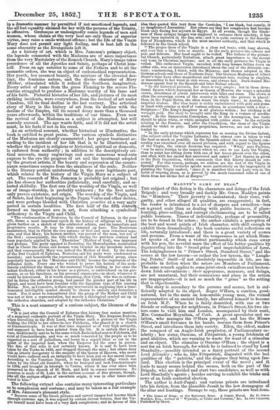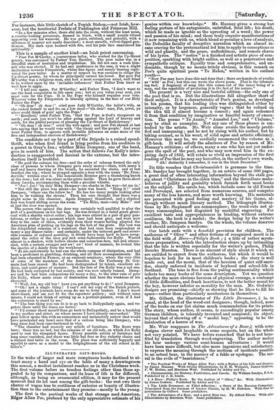MADDTIT I S GAME OF BRAG..
THE subject of this fiction is the characters and doings of the Irish Brigade : and very broadly and darkly Mr. Owen Maddyn paints the " Mimbers." Their poverty is caricatured; their vices, vul- garity, and other, alleged ill qualities, are exaggerated ; in fact, the reader is introduced to a set of sharpers and swindlers—less n a-grand scale than as -dealing with public business, if place- huntieg, place-selling, and corrupt electioneering are to be called public business. Traces of individuality, perhaps of personality, are to be found in the actors; the author exhibits a perception of the best and worst points of Irish character, with skill enough to exhibit them dramatically ; the book contains useful reflections on life, naturally introduced ; and there is a great variety of scenes and persons. From a want of the temperance in art which Ham- let speaks of, or from a violent partisanship which runs away with his pen, the novelist mars the effect of his better qualities by degenerating into the "broad grins" and improbabilities of farce. The lodginghouses in "Prince's Street, Stamford Street," and the scenes at the low tavern—or rather the low tavern, the " Laugh- ing Potato," itself—if not absolutely impossible ixt life, are im- probable in fiction when the actors are Members of Parliament The same remark applies to some joint-stock swindlers and broken- down Irish adventurers : their appearance, manners, and doings, are not unnatural, but their connexions and place in the action are inappropriate—it is not so mach the " gems " as the setting that is objectionable. The story is secondary to the persons and scenes, but is suf- ficiently adapted to its object. Roger O'Hara, a careless, good- natured., but in the main an honourable young man, the ruined representative of an ancient family, has allowed himself to become an Irish M.P. When he is fairly domiciled, with one or two friends or colleagues for neighbours, in Prince's Street, his two sis- ters come to visit him and London, accompanied by their aunt, Mrs. Counsellor Moynihan, of Cork. A great speculator and re- lation, who manages the O'Hara property, and has the Misses O'Hara's small fortunes in his hands, rescues them from Prince's Street, and introduces them into society. Ellen, the eldest, makes the conquest of an Anglo-Irish proprietor, of Parliamentary ce- lebrity; her sister, Onorine, of Fitzpatrick, a young Irishman of good abilities, which are running to waste for want of a stimulus and an object. The stimulus is Onorine O'Hara; the object is a seat for an Irish borough, for which he is induced to stand by Lord Shanbally,—possibly intended as a fancy portrait of the second _ Lord Alvanley ; who is, like Fitzpatrick, disgusted with the bad qualities of the "patriots," and the disgrace they bring upon Ire- land. This election is the principal event of the novel ; and it leads to many scenes behind the scenes, both on the part of the
who are divided and start two candidates, as well as with Lord Slianbally's agents ; besides serving to exhibit the tricks and rows of an Irish contested election.
The author is Anti-Papal; and various priests are introduced into his fiction, from the plausible Jesuit to the low demagogue of the altar and hustings. Strange to say, these priests are best done.
• The Game of Brag; or the Batterary Boys. A Comic Novel. By D. Owen Pdaddyn, Esq., Author of " Wynville, or Clubs and Coteries," 8m. In two volumes. Published by Skeet.
For Instance, this little sketoh of a Popish Bishop,—not Irish, how- ever, but the territorial Prelate of Paddington and Primrose HilL
"In a few minutes after, there slid into the room, withontlhe least noise, a courtly-looking personage, dressed in black, with a small purple riband appearing over his waiscoat. He was quiet, subdued, and graceful, with a silkiness of manner not easily described ; a most smooth, velvet-lipped gen- tleman. His dark eyes beamed with fire, and his pale face announced his spirituality."
This is a sample of another kind—an Irish priest canvassing. "Poor Pat M'Ciuthy, a journeyman tailor, who worked for the Up-Street gentry, was canvassed by Father Tom Buckley. The poor tailor was in a dreadful state of hesitation and trepidation. He did not care a rush him- self who was elected. If he had any preference in the case, it was a slight inclination towards Fitzpatrick, whose fine figure and manly bearing capti- vated the poor tailor. As a matter of respect he was anxious to oblige the Up-Street gentry, by whom he principally earned his bread. But poor Pat 31 `Carthy was a religious man, and had a most scrupulous mind, well fitted to be worked upon by the invisible influences' that Father Tom knew so well how to apply. "'I tell you again, Pat M'Carthy,' said Father Tom, don't want to use the least compulsion in life upon you ; but as you value your soul, you must vote for the Pope. It is the Pope who himself requires your vote. Whoever votes for Fitzpatrick is literally spitting in the face of our Holy Father the Pope.'
"'Oh dear ! oh dear ! ' cried poor Judy lirCarthy, the tailor's wife as she rocked herself to and fro on a low stool—' Oh dear! sure, Pat, jewel; ye nicer could think of goin' agin the Pope.' "'Recollect,' cried Father Tom, that the Pope is God's vicegerent on earth; and sure you won't be after going against the Lord of heaven and earth, for the pitiful purpose of pleasing the Up-Street of Bathdowney.' " ' Oh dear oh dear !' cried the wife again ; and poor Pat shrank at last into saying that he would vote with the clargy and the people.' And away went Father Tom, to operate with invisible influence on some more of the free and independent electors of Rathdowney."
The candidate set up by a part of the Brigade is a ruined spend- thrift, who when first found is lying perdue from his creditors in a garret in Gray's Inn ; whither Mike Dempsey, one of the band, goes in search of him. The action that follows Foe Kelly's intro- duction is exaggerated and farcical in the extreme, but the intro- duction itself is truthful.
"He paid the cabman his fare—and the order of cabman formed the only class of persons to whom Dempsey gave ready money—then' with many a puff and heavy drawing of the breath, he ascended the stairs, and at last reached the top ; where he stopped opposite a door with the name Mr. Pren- derville ' written over it. The honourable Member gave a thundering knock at the door ; but all was silent as the grave inside. Then he gave three short sharp knocks, accompanying them with a peculiar whistle.
'Joe ! Joe ! 'tis only Mike Dempsey—no sharks in the way—let me in.' "But still the place was silent—no noise was heard. Hang it !' cried Dempsey, where can the fellow be ? He has too many people looking after him to be walking the streets.' Then his ears thought that there was a slight noise in the chamber. Again Dempsey thundered, and a slipshod foot was heard sliding across the room. "Ds Mike, man—only Mike! and at last the door was opened.
The person who opened the door was certainly well qualified to play the part of a gentleman on his last legs. He was dressed in a faded green great- coat with a shabby velvet collar; his legs were attired in a pair of grey pan- taloons, or rather n a garment which once had been grey, and were now foxy to the ends of them, evidently from their wearer having adopted the American plan of putting up his legs on the hob of the grate. His vest was the dilapidated remains of a waistcoat that had once been resplendent at many a gay dinner-table : and certainly, under the tattered garb and miser- able remains of reduced gentility, it would have been hard to have recog- nized the relics of the once gay and semi-fashionable Joe Kelly. Wasted almost to a shadow, with hollow cheeks and colourless face, tall and attenu- ated, with a certain swagger and awl aw ! kind of manner, he looked like the spectre of a dandy from the workhouse. "At six-and-twenty he had run the whole compass of dissipation, and had been a proficient in gambling, drinking., and all their accompaniments. He had been educated in France, at an eminent seminary, where the very 4lite of some of the members of the families in the Faubourg St. Ger- main had been reared. He had been distinguished by talent, excellent ad- dress, and quiet grace of manner. But the fate of Joe Kelly was a sad one. He had been corrupted by bad society, and was now utterly ruined. Demp- sey and he had been companions for many a day, to the utter ruin of poor Joe Kelly, whose main cause of destruction had been the weakness of his character.
"Well, Joe, my old boy ! have you got anything to do ? ' cried Dempsey.
" Oh ! not a single thing ! I can't sell my copy of the Dutch picture, and none of the journals have room for me to write leaders. I don't know short-hand, and am not fit for the reporters' gallery; and without some means, I could not think of setting up as a portrait-painter, even if I had the connexion to stand by me.'
" ' The best thing you can do is to go back to Ballypa]lady again, and ve- getate there until the times are better.' 'I'd sooner shoot myself than go back to Ballypallady, and be a hardship to my mother and sister, on whose means I have already encroached.' The poor fellow spoke this with an earnestness and melancholy sorrow that would have penetrated any heart save that of a callous being like Dempsey, who long since had been case-hardened in vice.
"The chamber had scarcely any article of furniture. The floors were bare; there was no bed, but the remains of an old sofa, on which Joe Kelly used to rest his elongated figure. Every possible article of furniture had long since vanished, and there was little but four or five ricketty chairs and a stained deal table in the room. The place was sufficiently beggarly and squalid to serve as a model to the lodgiughouses of the old school in St.



























 Previous page
Previous page